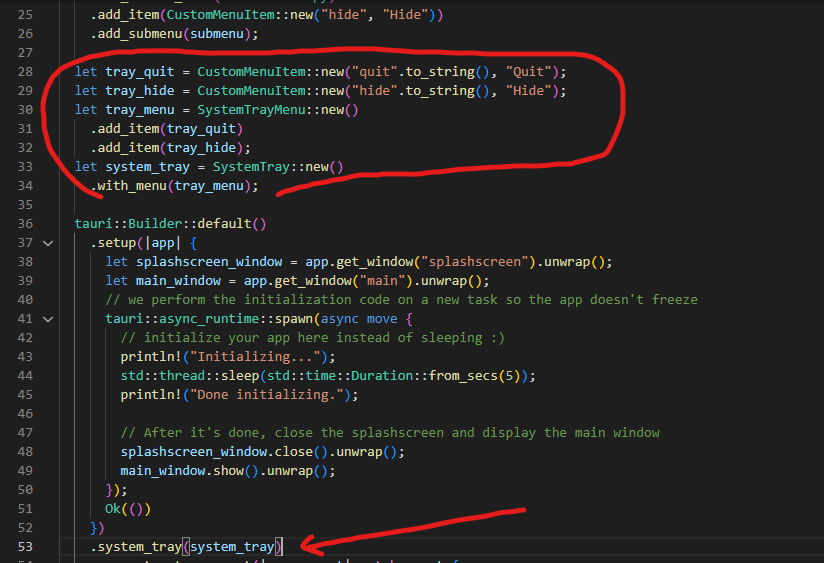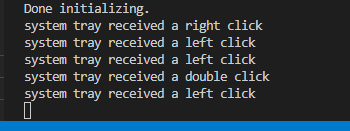今天我們簡單的創建system tray
首先,打開todo\src-tauri\tauri.conf.json並加入systemTray在tauri裡
"systemTray": {
"iconPath": "icons/icon.png",
"iconAsTemplate": true
},
{
"build": {
"beforeDevCommand": "pnpm dev",
"beforeBuildCommand": "pnpm build",
"devPath": "http://localhost:1420",
"distDir": "../dist",
"withGlobalTauri": true
},
"package": {
"productName": "todo",
"version": "0.0.0"
},
"tauri": {
"systemTray": {
"iconPath": "icons/icon.png",
"iconAsTemplate": true
},
...
接著到todo\src-tauri\src\main.rs
// 引入
use tauri::{CustomMenuItem, SystemTrayMenu, SystemTrayMenuItem};
// Config system tray 上下文menu
// 創建SystemTrayMenu
let tray_quit = CustomMenuItem::new("quit".to_string(), "Quit");
let tray_hide = CustomMenuItem::new("hide".to_string(), "Hide");
let tray_menu = SystemTrayMenu::new()
.add_item(tray_quit)
.add_item(tray_hide);
let system_tray = SystemTray::new()
.with_menu(tray_menu);
設定app system tray
接著,我們來進行測試能看到已經創建好system tray了

引入SystemTrayEventuse tauri::{SystemTray, SystemTrayMenu, SystemTrayEvent};
現在我們來監聽system tray events,我們加入
.system_tray(system_tray)
.on_system_tray_event(|app, event| match event {
SystemTrayEvent::LeftClick {
position: _,
size: _,
..
} => {
println!("system tray received a left click");
}
SystemTrayEvent::RightClick {
position: _,
size: _,
..
} => {
println!("system tray received a right click");
}
SystemTrayEvent::DoubleClick {
position: _,
size: _,
..
} => {
println!("system tray received a double click");
}
SystemTrayEvent::MenuItemClick { id, .. } => {
match id.as_str() {
"quit" => {
std::process::exit(0);
}
"hide" => {
let window = app.get_window("main").unwrap();
window.hide().unwrap();
}
_ => {}
}
}
_ => {}
})
我們試著對tauri的system tray做連點、右鍵、左鍵點擊
能看到他監聽到了我們的print事件
todo\src-tauri\src\main.rs
#![cfg_attr(
all(not(debug_assertions), target_os = "windows"),
windows_subsystem = "windows"
)]
use std::sync::Mutex;
use tauri::{CustomMenuItem, Menu, MenuItem, Submenu, Manager};
use tauri::{SystemTray, SystemTrayMenu, SystemTrayEvent};
mod todo;
use todo::{Todo, TodoApp};
struct AppState {
app: Mutex<TodoApp>,
}
fn main() {
let app = TodoApp::new().unwrap();
// here `"quit".to_string()` defines the menu item id, and the second parameter is the menu item label.
let quit = CustomMenuItem::new("quit".to_string(), "Quit");
let close = CustomMenuItem::new("close".to_string(), "Close");
let submenu = Submenu::new("Custom", Menu::new().add_item(quit).add_item(close));
let menu = Menu::new()
.add_native_item(MenuItem::Copy)
.add_item(CustomMenuItem::new("hide", "Hide"))
.add_submenu(submenu);
let tray_quit = CustomMenuItem::new("quit".to_string(), "Quit");
let tray_hide = CustomMenuItem::new("hide".to_string(), "Hide");
let tray_menu = SystemTrayMenu::new()
.add_item(tray_quit)
.add_item(tray_hide);
let system_tray = SystemTray::new()
.with_menu(tray_menu);
tauri::Builder::default()
.setup(|app| {
let splashscreen_window = app.get_window("splashscreen").unwrap();
let main_window = app.get_window("main").unwrap();
// we perform the initialization code on a new task so the app doesn't freeze
tauri::async_runtime::spawn(async move {
// initialize your app here instead of sleeping :)
println!("Initializing...");
std::thread::sleep(std::time::Duration::from_secs(5));
println!("Done initializing.");
// After it's done, close the splashscreen and display the main window
splashscreen_window.close().unwrap();
main_window.show().unwrap();
});
Ok(())
})
.system_tray(system_tray)
.on_system_tray_event(|app, event| match event {
SystemTrayEvent::LeftClick {
position: _,
size: _,
..
} => {
println!("system tray received a left click");
}
SystemTrayEvent::RightClick {
position: _,
size: _,
..
} => {
println!("system tray received a right click");
}
SystemTrayEvent::DoubleClick {
position: _,
size: _,
..
} => {
println!("system tray received a double click");
}
SystemTrayEvent::MenuItemClick { id, .. } => {
match id.as_str() {
"quit" => {
std::process::exit(0);
}
"hide" => {
let window = app.get_window("main").unwrap();
window.hide().unwrap();
}
_ => {}
}
}
_ => {}
})
.menu(menu)
.on_menu_event(|event| match event.menu_item_id() {
"quit" => {
// Custom
std::process::exit(0);
}
"close" => {
// Custom
event.window().close().unwrap();
}
"hide" => {
println!("Hide Click");
}
_ => {}
})
.invoke_handler(tauri::generate_handler![
get_todos, new_todo, done_todo, delete_todo
])
.manage(AppState {
app: Mutex::from(app),
})
.run(tauri::generate_context!())
.expect("failed to run app");
}
...
今天簡單的介紹了Tauri的System Tray,我們明天見
